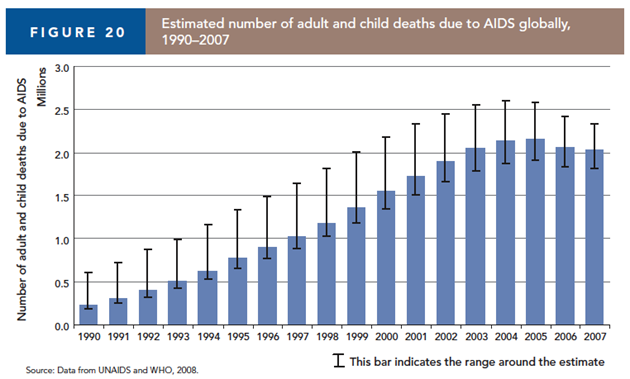日本では少子化を食い止めるかということに莫大な予算を投じようとしているが、世界的にも少子化は進んでいる。違うのは、別にそれほど悪いことだとは思われていないことだ。
Fertility and living standards: Go forth and multiply a lot less | The Economist

あと2、3年のうちの世界の半数の国で(合計特殊)出生率が2.1を切ろうとしている。2.1というのは人口を維持していくのに必要な数値だ。上のグラフは各国の一人あたりGDPを出生率に対し片対数プロットしたものである。ここのプロットの大きさは人口を表している。この傾向は先進国だけにとどまらない:
Between 1950 and 2000 the average fertility rate in developing countries fell by half from six to three—three fewer children in each family in just 50 years.
半世紀の間に発展途上途上国の出生率は半分に減った。これが世界全体の平均出生率に大きな影響を与えるのは言うまでもない。次の段落は、どうして出生率が減ったのかについてバランスのとれた見方を示している:
Now imagine you are a bit richer. You may have moved to a town, or your village may have grown. Schools, markets and factories are within reach. And suddenly, the incentives change. A tractor can gather the harvest better than children. Your wife may get a factory job—and now her lost wages must be set against the benefits of another baby. Education, thrift and a stake in the future become more important, and these middle-class virtues go hand in hand with smaller families. Education costs money, so you may not be able to afford a large family. Perhaps the state provides a pension and you no longer need children to look after you. And perhaps your wife is no longer willing to bear endless offspring. Higher living standards, better communications and more education enable you to rely on markets and public services, not just yourself and your family.
市場の発達は出産に係るインセンティブの構造を大きく変えた。子供の労働への需要の減少、女性の労働市場参入による育児の(機会)費用増大、教育費の増加、社会保障の充実などは何れも子供を作るインセンティブを減らす。少子化を食い止めたいのであればこれらの要素を打ち消すような政策を採ればよい。
- 子供が行っていた仕事を肩代わりする財・サービスの規制
- 女性の労働市場参加に対する制限
- 育児費用の補助
- 教育費の補助ないし教育の制限
- 社会保障の削減
しかし、これらの多くは社会的に受け入れられるものではなく、実際に選択されるのは育児費用・教育費用の補助だけになるだろう。少子化が進む原因の一部しか対策が打てない以上、少子化対策が困難なのは当然である。ではそもそも少子化対策は必要なのだろうか。
少子化を含めある現象が社会的に望ましくないかないかは以下の二点できまるだろう:
- インセンティブに基づいて最適な行動がとれていない場合
- 正しいインセンティブが与えられていない場合
しかし、この二つの観点から少子化を見ると何れも少子化は望ましい現象であるように思われる。
The link between wealth and fertility does not explain everything. In some countries, poor women have the same number of children as rich ones. This suggests that other factors are at work. The most obvious is that many people in poor countries want fewer children, and family planning helps them get their wish.
貧しい国において、多くの人はもともとあまり多くの子供を欲しておらず、避妊技術がそれを可能にしたと述べられている。これは一点目の議論だ。避妊技術がない場合、冷静に考えれば子供がもう必要ではないにも関わらず妊娠・出産に至るということは十分にありえる。
記事においては、調査によると欲しいと思う子供の数は実際の子供の数よりも多く、またアフリカでは避妊をしたいと考えていてもできないと答えている女性が多いと述べられている。もちろん、調査での答えと実際の行動とは一致するわけではないが、少子化の原因の一つは女性が自分の思う通りに出産をコントロールできるようになったことであるのは確実だ。避妊技術の普及と女性の教育水準向上がこれを可能にした。そしてこれは望ましい変化だろう。
では、女性の出産へのコントロールが増したとして少子化が社会的に望ましくない根拠は何だろう。それは出産に関するインセンティブが社会の利益と一致していない場合になる。しかしこちらに関しても少子化が社会的に望ましくないと主張するのは難しい。それどころかいくつもの利点が挙げられている:
Cutting the fertility rate from six to two can help an economy in several ways. First, as fertility falls it changes the structure of the population, increasing the size of the workforce relative to the numbers of children and old people.
一つ目は人口構成の変化だ。発展途上国であれば少子化は労働人口の増加を意味する。これは日本のような先進国にはあてはまらないが、世界の多くの国で成り立つ。
By making it easier for women to work, it boosts the size of the labour force.
育児負担軽減は女性の労働市場への進出を促す。確かに高齢化が進めば、働く世代の総数は減っていくが、女性の労働がそれを打ち消すように働く。
Because there are fewer dependent children and old people, households have more money left for savings, which can be ploughed into investment.
さらに労働人口の相対的増加は貯蓄率の上昇とそれに伴う投資の増大を呼び起こす。高齢化が進む日本では貯蓄率は減少しているが次の点は日本にあてはまる:
Lastly, low fertility makes possible a more rapid accumulation of capital per head.
最後は一人当たり資本の増加だ。特に土地のように供給が固定的(で減価しない)な財がこれにあたる。
政治家は少子化対策をどうするか叫ぶ前にそもそも少子化の何が問題なのか、そして出生率のコントロールがその問題に対する適切な答えなのかを論じるべきだ。個人的には少子化にまつわる問題は過大評価されいるし、出生率を上昇させる試みはポイントを外している思う。


